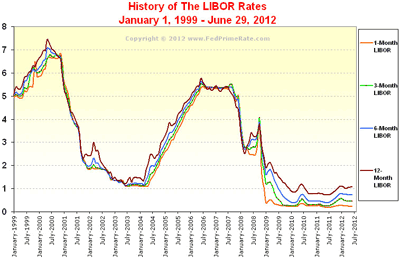I found myself reacting to the Libor scandal more strongly than a lot of the earlier revelations of financial institutions misdeeds. First, the banks were just blatant out-and-out lying about a simple number.
Second, their lying led to a distortion of a crucial piece of publicly available data–the Libor rate. In a market economy, intentional misrepresentation of a market price is not a victimless crime –in fact, the victims are everyone who relied on that price to make decisions. That includes regulators who presumably watched Libor as one of their guides to the amount of stress in the global banking system. Here’s a chart of Libor across the key period (downloaded from http://www.fedprimerate.com).
(click to enlarge)
Would Libor have shown more signs of stress sooner if it wasn’t being manipulated in 2007 and 2008? And would banks, regulators, and investors reacted sooner? We’ll never know.
But this confirms what I’ve written in the past–the financial crisis was in part a data crisis, where all sorts of numbers were sending misleading signals. In particular, the strength of the financial position of the banks was overstated.
The question is whether the Libor scandal is a vestige of the past, or a sign of future troubles to come. My sense is that we’ll see a lot more opportunities for manipulation of private data to send misleading public signals. Forget about financial markets for the moment. I’m thinking now about the way that websites continually try to game Google’s search algorithms in order to get a higher ranking. Hotels and restaurants have a big incentive to try and manipulate their reviews on consumer sites such as Yelp. App developers have an incentive to game their reviews on the Apple and Google app stores.
Will the bad information drive out the good? Or can we build information aggregation mechanisms that are more difficult to manipulate?



Leave a Reply